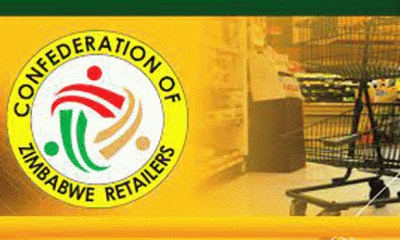Business
CZR Calls for Stronger Consumer Protection, Regulatory Reform at National Workshop

The Confederation of Zimbabwe Retailers (CZR) has called for urgent reforms in regulatory processes and stepped-up efforts to tackle counterfeit goods in the market, during the opening of the Consumer Affairs and Anti-Counterfeit Measures Workshop held in Harare recently.
Speaking on behalf of CZR President Denford Mutashu, a representative from the Confederation opened the workshop by outlining key challenges faced by formal retailers and wholesalers, including the rising tide of counterfeit products, an uneven playing field with informal traders, and regulatory burdens stifling business growth.
The event, held under the theme of strengthening consumer protection and promoting ethical trade, brought together a wide array of stakeholders including government officials, industry regulators, law enforcement, business associations, and consumer rights advocates.
The Guest of Honour, Honourable Minister of Industry and Commerce Mangaliso Ndlovu, was represented by Mr. Gowora from the Ministry. Other notable attendees included the Consumer Council of Zimbabwe CEO Mrs. Rose Mpofu, Zimbabwe Republic Police spokesperson Commissioner Paul Nyathi, and representatives from organisations such as the Confederation of Zimbabwe Industries (CZI), Zimbabwe National Chamber of Commerce (ZNCC), and the SME Association of Zimbabwe.
CZR emphasised the urgent need to crack down on the proliferation of counterfeit and substandard products in the Zimbabwean market, warning that the trade poses serious risks to consumer safety, undermines confidence in brands, and threatens compliant businesses.
“A market flooded with counterfeit goods not only violates consumer rights but distorts fair competition, exposes the public to health and safety risks, and reduces fiscal revenue,” the representative said. “This issue must be addressed through tighter enforcement, public education, and stronger penalties for offenders.”
The organisation pledged full support for the implementation of the Consumer Protection Act, which was described as a vital legislative tool in protecting consumer interests and promoting fair trade practices.
While expressing commitment to compliance and ethical trading, CZR raised concerns over what it described as “compliance fatigue” in the formal sector due to overlapping and burdensome licensing, inspection, and regulatory requirements.
“Formal businesses are being stretched thin by a fragmented and often inconsistent regulatory environment,” said the CZR representative. “We advocate for harmonisation of these processes, the digitisation of licensing systems, and a shift towards a one-stop-shop model.”
The Confederation also criticised the continued closure of licensed retail outlets by some local authorities, particularly the City of Harare, calling for a more transparent, consistent, and dialogue-based approach to enforcement.
CZR expressed concern over the growing dominance of the informal market, which it argued operates without regulation, tax obligations, or adherence to labour and consumer safety standards.
“This creates an uneven playing field for compliant operators,” the representative noted. CZR urged the government to develop a simplified national formalisation strategy that incentivises and supports informal traders to enter the formal economy.
Beyond regulatory and market concerns, the Confederation also highlighted its involvement in national social causes. CZR announced its active participation in the fight against drug and substance abuse, an initiative led by the Office of the Minister of State for Harare Metropolitan Province and championed by the First Lady of Zimbabwe.
“No economy can thrive while its youth are being destroyed by drugs,” the representative stated. “CZR is committed to mobilising resources and building awareness to support this national priority.”
In closing, CZR reaffirmed its commitment to working with government agencies, regulators, and private stakeholders to foster a fair and trustworthy commercial environment.
“This workshop is not just about identifying problems—it is about finding practical solutions through collaboration,” the representative concluded. “Consumer protection and anti-counterfeiting are not government responsibilities alone; they require shared commitment from all players.”
The workshop was supported by National Foods Limited and attended by members of the media, civil society, and various business and consumer-focused organisations.
Business
Zimbabwe Bets Big on Biotech to Fuel Industrial Revolution


Dr. Eng. Willie Ganda
By Enia Dube
The Minister of Higher and Tertiary Education, Innovation, Science and Technology Development, Hon. Dr Fredrick Shava, has thrown his weight behind biotechnology as a key driver of the country’s industrialisation and modernisation agenda.
Speaking at the National Biotechnology Authority (NBA) Strategic Planning Workshop in Kadoma, Dr Shava urged the Authority to identify biotechnology-led opportunities that can boost national production and accelerate economic growth.
“Biotechnology serves as a key catalyst for NDS2 implementation, advancing inclusive economic growth, job creation, and sustainable industrial development,” Dr Shava said, emphasising the need to integrate biotechnology into national value chains to unlock a biotechnology-driven economy. He added that this would turn innovation into industry, knowledge into enterprise, and science into jobs.
The NBA has made notable progress in establishing a strong regulatory framework, promoting biotechnology research and commercialisation, and raising public awareness about the sector’s potential. The Authority has successfully commercialised products such as Mapfura wine and Cofsol cough syrup, and has several other biotechnology products in the pipeline.
Incoming NBA Board Chairperson, Professor Idah Sithole-Niang, echoed Dr Shava’s sentiments, emphasising that the Authority’s five-year strategic plan must meaningfully contribute to the attainment of Vision 2030. “This event marks a significant milestone in the Authority’s ongoing efforts to enhance the role of biotechnology in Zimbabwe’s socio-economic development,” she said.
The workshop aimed to realign priorities and resources in response to emerging technologies and global biotechnology trends, and develop a strategic roadmap to strengthen biotechnology as a key driver of Zimbabwe’s socio-economic transformation. The rapidly evolving global biotechnology landscape, including advancements in gene editing, bio-manufacturing, and climate-smart innovations, presents both new opportunities and challenges for Zimbabwe.
“We recognise the pressing need for an inclusive and forward-looking strategic plan that can navigate the complexities of the biotechnology landscape,” Professor Sithole-Niang noted. The workshop was attended by researchers, government officials, and NBA staff, who are optimistic about the potential of biotechnology to drive Zimbabwe’s economic transformation and achieve Vision 2030.
Business
GAS COMPANY, DIRECTOR IN COURT OVER ALLEGED TAX VIOLATIONS

A Harare-based liquefied petroleum gas retailer, Prompt Gas, and its director, Gift Patsika, have appeared in court on allegations of breaching tax and exchange control regulations involving more than R8 million.
The pair appeared before regional magistrate Marewanazvo Gofa on Wednesday.
According to prosecutors, detectives from the CID Asset Forfeiture Unit were deployed on Monday under an operation code-named “Pressure Valve,” which focused on inspecting fuel and LPG businesses for compliance in areas such as licensing, pricing, funding sources and banking transactions.
Investigators visited Prompt Gas premises at 1170A3 Mutare Road, where initial checks indicated that the company had imported gas from Mozambican supplier IPG between January 1 and November 18 this year at a cost of R8,006,055.75.
The State alleges that Patsika failed to furnish proof that the imports were processed through formal banking channels as required. Authorities further claim the company made offshore payments without Reserve Bank of Zimbabwe approval, in violation of exchange control regulations.
The court also heard that the origins of the funds used for the purchases could not be accounted for, raising possible money laundering concerns.
The matter is expected to continue as investigations proceed.
Business
Zimbabwe Slashes Energy Costs in Bid to Boost Economy


The Zimbabwean government has taken a significant step towards reducing business costs and attracting investment by slashing a range of licenses, levies, and fees in the energy sector. This move is part of a broader effort to modernize regulation and make the country a more competitive destination for capital.
The reforms are a direct response to the need to reduce the cost of doing business and accelerate growth in key energy subsectors, said Information Minister Dr. Jenfan Muswere, announcing the measures after Tuesday’s Cabinet meeting. The review followed extensive consultations with ministries, government agencies, and energy sector players, and forms part of the broader reform package approved by Cabinet in July last year.
The Zimbabwe Energy Regulatory Authority licence application fee has been reduced from US$2,500 to US$2,000, while the solar generation licence fee of US$2,875 has been completely removed. The petroleum import procurement license has been cut by half from US$30,000. In rural areas, the fuel retailing license has been reduced from US$200 to US$150, and the LPG retail license fee is being reduced by 50% from the current US$230.
The government recognizes that energy investment had been largely carried by the state, a position that had become unsustainable due to limited fiscal space. The new fee structure is intended to open the sector to more private investors by lowering barriers and eliminating outdated charges. “Government continues to prioritise reforms that improve the ease of doing business in order to attract and retain investment,” Dr. Muswere said.
The announcement adds to a growing list of business reforms underway across multiple sectors, including sweeping license consolidations and fee cuts in retail, hospitality, and financial services. These broader measures have included merging fragmented shop licenses, eliminating redundant permits, capping SME license fees at US$500, and cutting hotel license fees by 50%. Additional refinements to the new energy fee schedule will be finalised before gazetting once ministries complete the necessary legislative and administrative adjustments.
-

 Current Affairs1 week ago
Current Affairs1 week agoOperation restore order
-

 Crime and Courts2 months ago
Crime and Courts2 months agoMasasi High School Abuse Scandal Sparks Public Outcry
-

 Crime and Courts2 months ago
Crime and Courts2 months agoKuwadzana Man Jailed for Reckless Driving and Driving Without a Licence
-

 Current Affairs3 months ago
Current Affairs3 months agoMunhumutapa Day: Zimbabwe’s Newest Public Holiday Set for Annual Observance
-

 Current Affairs4 months ago
Current Affairs4 months agoBreaking: ZIMSEC June 2025 Exam Results Now Available Online
-

 Current Affairs1 month ago
Current Affairs1 month agoBREAKING NEWS: ZANU PF Director General Ezekiel Zabanyana Fired
-

 Current Affairs3 months ago
Current Affairs3 months agoGovernment Bans Tinted Car Windows in Nationwide Crime Crackdown
-

 Current Affairs2 months ago
Current Affairs2 months agoExposed: Harare GynecologistChirume Accused of Negligence, Extortion, and Abuse















